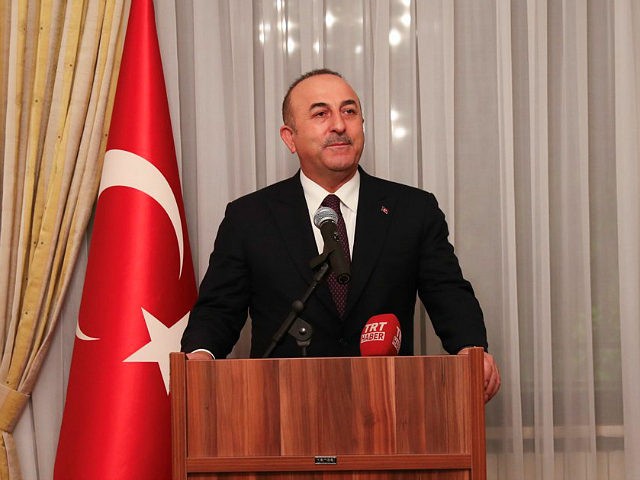Turkish warplanes reportedly bombed a mosque in the Duhok province of the Kurdistan Region on Monday, even as Turkish Foreign Minister Mevlut Cavusoglu was in the Kurdish capital of Erbil to discuss security issues and economic relations.
According to the Kurdistan 24 news service, Turkish planes “heavily bombarded” the villages of Kani Maze and Bebad for several hours, “causing panic among villagers living in the area.” The target was a mosque allegedly used as a headquarters by fighters for the Kurdistan Workers’ Party (PKK), a violent separatist organization the Turkish government sees as a major security threat. Turkey has gone to extreme lengths to attack PKK positions beyond its borders.
Kurdistan 24 noted there have been heavy civilian casualties during battles between Turkish forces and the PKK and frightened residents have evacuated villages near the Turkish border with the Kurdistan Region.
Turkish Foreign Minister Mevlut Cavusoglu landed in Erbil on Sunday for meetings with Kurdistan Regional Government (KRG) Prime Minister Nechirvan Barzani, a trip that also took Cavusoglu to Baghdad for meetings with Iraqi Prime Minister Adil Abdul-Mahdi.
“A major topic explored in Cavusoglu’s separate meetings with Iraqi and Kurdish officials was the growth of bilateral trade. Turkey has a large business presence in the country and exports many goods while it imports substantial amounts of oil from Iraq and the Kurdistan Region,” Kurdistan 24 reported on Monday.
The KRG is worried about the fate of Kurds in Syria, trapped in an unofficially autonomous region on the Turkish border and unable to work out a deal for support and protection from the Syrian government.
Barzani shared his concern for “the future of the Turkish people” with Cavusoglu and urged him to “help advance peace for all of the Syrian peoples.”
Turkey views all armed Kurdish groups in Syria as elements of the PKK or its allies and has invaded northern Syria to drive the Kurds back. The Turks have threatened an even more forceful drive against the Syrian Kurds for months, held back in part by the lingering presence of U.S. troops. Syrian dictator Bashar Assad has evidently decided not to strongly object to Turkish forces rolling across his borders unless the Kurds purchase his protection.
Cavusoglu announced new cooperation between Turkey and the KRG during his trip to Erbil, including the opening of a new border gate between eastern Turkey and the KRG in northern Iraq.
He also talked up security cooperation between Ankara and Erbil against terrorist groups including ISIS, the PKK, and Turkey’s other nemesis, the Fethullah Terrorist Organization (FETO), the official Turkish designation for the followers of exiled imam Fethullah Gulen. The Turks contend FETO is allied with the PKK and has encouraged Kurdish separatist violence as part of its plan to undermine the government of Turkish President Recep Tayyip Erdogan.
The Kurdish news service Rudaw was considerably less upbeat about Cavusoglu’s visit to Erbil than Turkish papers were, describing KRG citizens as feeling “a justifiable sense of alarm” when they hear Turkish officials wheedling support from the Barzani government for tougher action against the PKK.
“Is this the prelude to more air strikes around PKK camps in Iraqi Kurdistan, or another embargo on the Syrian Kurds?” Missouri State University Professor of Middle East Politics David Romano asked in a Rudaw column – a question that would appear to have been answered by the airstrikes in Duhok province.
Romano saw an opportunity for the KRG in Turkey’s flagging economy, which might be the more urgent reason for Cavusoglu’s trips to Erbil and Baghdad:
As the recent municipal elections in Turkey amply demonstrated, economic decline threatens President Erdogan and his government much more than Kurdish bogeymen.
Cavusoglu’s visit comes just as American waivers for sanctions on Iran are set to expire. Although Cavusoglu and President Erdogan made a big show of denouncing and rejecting Washington’s threat to blacklist companies and countries importing Iranian oil, Turkey seems to have little choice in complying with the sanctions now that the waiver program will not be renewed.
Since a while, Turkey has imported as much as 50% of its crude oil from Iran. Although Ankara was able to reduce the share of Iranian imports to lower levels for some months of the last few years (to as low as 20%), alternative suppliers of oil to Turkey such as Russia and Saudi Arabia involve much higher transport and associated fees than Iranian crude.
Since Iraqi oil imports must pass through the KRG to reach Turkey, Romano saw an opportunity for improved relations between Ankara and Erbil, with the latter possibly gaining enough economic leverage to ask Erdogan to back off the Syrian Kurds a little. That would be an interesting, and most welcome, side benefit to the restored U.S. oil sanctions against Iran.

COMMENTS
Please let us know if you're having issues with commenting.